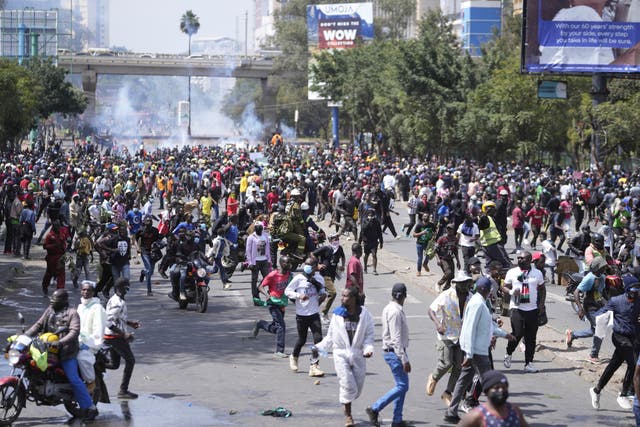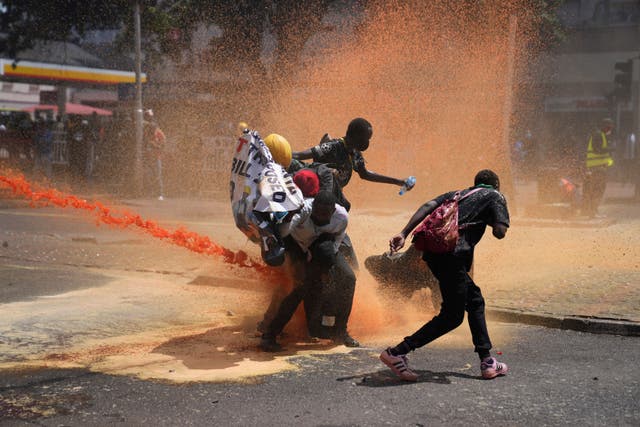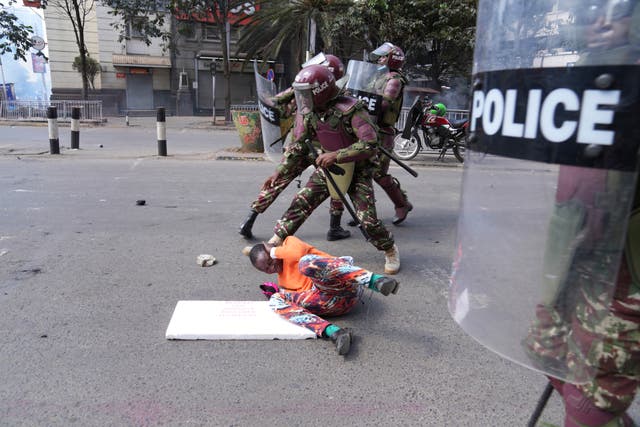Part of Kenya’s parliament building has been burned as thousands of protesters against a new finance Bill entered and legislators fled, in the most direct assault on the government in decades.
Journalists saw at least three bodies outside the complex where police had opened fire, and medical workers reported five others killed.
Kenya’s defence minister said the military had been deployed to support police during the “security emergency” and “breaching of critical infrastructure”.
Protesters had demanded that legislators vote against the Bill imposing new taxes on a country, East Africa’s economic hub, where frustrations over the high cost of living have simmered.
But legislators voted to pass the Bill, then fled through a tunnel as protesters, many of them youth, outmanoeuvred police to enter.
The fire was later put out.
At least five people were shot dead while treating the wounded, the Kenya Medical Association and other groups said in a joint statement.
It said more than 30 people were wounded, at least 13 with live bullets.
One person shot dead was wrapped in a Kenyan flag and carried away.
Another lay on the pavement, their head in the gutter.
As the sun set hours later, Kenya’s government still had no comment.

Mr Ruto was outside Nairobi attending an African Union retreat.
He had been expected to sign the finance Bill into law this week and has two weeks to act.
The office of the Nairobi governor, a member of the ruling party, was also briefly on fire on Tuesday, with smoke pouring from its white facade.
The office is located near parliament.
Police water cannons were used to extinguish the fire.
Protesters could be heard shouting: “We’re coming for every politician.”
Police fired live ammunition and threw tear gas canisters at protesters who sought treatment at a medical tent set up at a church near the parliament complex.
Elsewhere, Kenyatta National Hospital said it had received 45 “victims”, though it was not immediately clear if any were dead.
The Kenya Human Rights Commission shared a video of officers shooting at protesters and said they would be held to account, and it urged Mr Ruto to issue an immediate order to “stop the killings”.

The politician, who had promoted himself as a “hustler” from humble beginnings, said he would engage them on their concerns.
But they last week announced they were uniting to keep the government in check as prices for fuel, basic foods and other necessities have soared.
In Nairobi, a regional hub for expatriates and home to a major United Nations complex, the inequality among Kenyans has sharpened along with long-held frustrations over state corruption.
Opposition to the finance Bill has united a large part of the country, with some explicitly rejecting the tribal divisions that have torn Kenya apart in the past.
Some who had passionately supported Mr Ruto felt betrayed.
“I fell for his lies. Now I’m out here regretting why I voted for him,” youth Oscar Saina told The Associated Press last week.
As throngs of protesters rushed through the streets, defiance emerged elsewhere in the country on Tuesday – including in the town where Mr Ruto was, Naivasha, as protesters chanted “Ruto must go.”
Protesters tried to storm the State House in the western city of Nakuru, a witness said.
There were clashes in the western lakeside city of Kisumu.
The governor of Mombasa, Kenya’s second largest city, joined protesters outside his office and expressed his support for them.
Protesters burned ruling party offices in Embu in central Kenya, the Nation newspaper reported.

Another media outlet, broadcaster KTN, issued a statement saying that “we have received threats from the authorities to shut us down” as coverage continued.
A national gathering of Catholic bishops urged police not to attack protesters and pleaded with the government to listen to citizens’ pain over the “unwarranted” taxes, saying “the country is bleeding … families are immensely suffering”.
Two people died in similar protests last week, and civil society groups have raised the alarm about a crackdown.
Kenya Law Society president Faith Odhiambo said earlier on Tuesday that 50 Kenyans, including her personal assistant, had been “abducted” by people believed to be police officers.
Some of those missing included those who were vocal in the demonstrations and were taken from their homes, workplaces and public spaces ahead of Tuesday’s protests, according to civil society groups.
Police officials did not immediately return calls seeking comment.
Parliament speaker Moses Wetangula had directed the inspector general of police to provide information on the whereabouts of those reportedly abducted.






